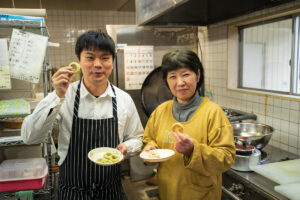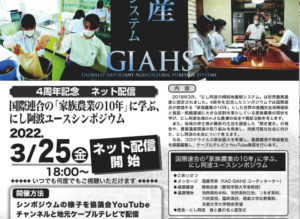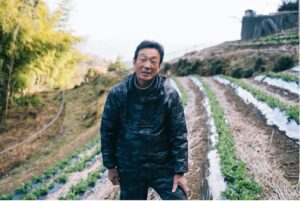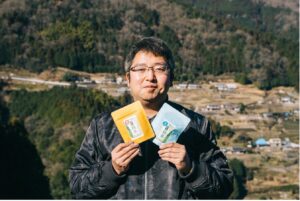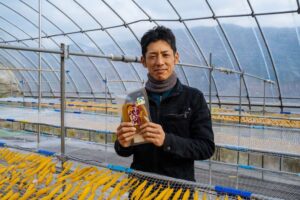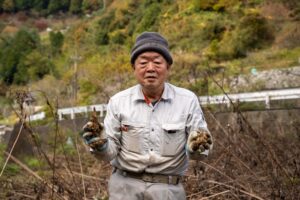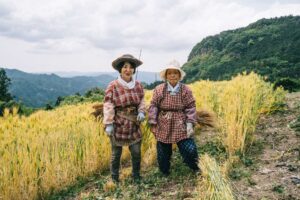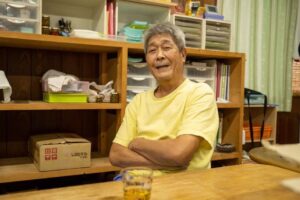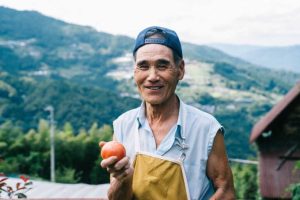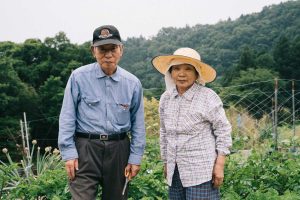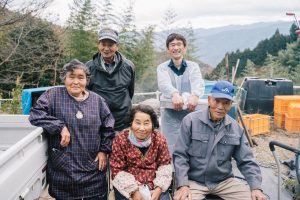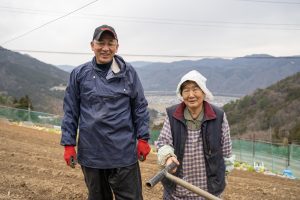Yoko Takeoka|The People Supporting Globally Important Agricultural Heritage System
―Yoko Takeoka(Representative of Mikamon, a homemade confectionery factory)―(Higashi-Miyoshi Town) Mrs. Takeoka makes "Awanowakka Inoko cookies" modeled after the Nishi-Awa region's traditional "Inoko sweets" confectionery. "Awanowakka" was created in cooperation with "Sora no Sato," which promotes tourism in the western part of Tokushima prefecture. The moist "Inoko sweets" are rearranged into crispy cookies in a modern style under the supervision of chef Mr.Naoya Higuchi. There are four flavors: hattaiko, green tea, strawberry, and cocoa. Ingredients are used for their products, certified as a globally important agricultural heritage system, the "Nishi-Awa Steep Slope Land Agriculture System." They are sold at " roadside station Mikamo" and other places and are so popular that […]
The 4th anniversary symposium of the Nishi-Awa Globally Important Agricultural Heritage System (GIAHS) site: Learning from “United Nations Decade of Family Farming”
In 2018, the Food and Agriculture Organization designated the Nishi-Awa steep-slope agricultural system as a Globally Important Agricultural Heritage System (GIAHS) site. In the symposium commemorating the 4th anniversary of the event, we plan to focus on family farming, which plays an important role in ensuring food security and eradicating poverty and hunger at the global scale. To support the United Nations Decade of Family Farming, we aim to promote activities that can preserve and contribute to small-scale farming in the Nishi-Awa region. In addition, local students will report on their “Kikigaki”(which translates to “listening” and “writing”) research on the lives of farmers, and agricultural heritage-related initiatives will be presented […]
Itaru Sato|The People Supporting Globally Important Agricultural Heritage System
Itaru Sato (Ashiro in Higashi-Miyoshi Town) There was a village called Dodoro in the mountains at an altitude of approximately 500 m in the Ashiro district of Higashi-Miyoshi town. About 50 years ago, there were ten private homes in this area, but the place name "Dodoro" is no longer used because the number of houses has been decreased to two. Mr. Itaru Sato runs a farm in the village. He now lives at the foot of the mountain but grew up in this village. His 83-year-old mother, Mrs. Kayoko, lives alone in the family home, and Mr. Sato grows vegetables and indigenous millets in this field. His father grew leaf […]
Hiroaki Kondo |The People Supporting Globally Important Agricultural Heritage System
Hiroaki Kondo (Iuchi, Ikawa Town in Miyoshi City) Tea plantations on mountain slopes are distributed throughout the Iuchi district of Ikawa Town in Miyoshi City. Tea cultivation has flourished on steep mountain slopes in this area; however, fewer people can manage their tea plantations because of population aging. Under such circumstances, to revive local tea as a specialty product, Mr. Hiroaki Kondo of Kondo LLC began managing tea farms in this district for older people who could no longer grow tea. Mr. Kondo and his father manage eight tea farmlands from five retired farmers, including his tea farm near his house and some farms on the opposite side of the […]
Keiichiro Yamashita|The People Supporting Globally Important Agricultural Heritage System
Keiichiro Yamashita (Ikeda Town in Miyoshi City) Koyatoko district is located in Nishiyama of Ikeda town, a small village in the mountains above JR Tsubojiri station known as an unexplored station. Mr.Keiichiro Yamashita decided to quit the company he had been working for and take over his family's farming business in 2020. His family grows mainly fruit, tomatoes, and sweet potatoes. They harvest tomatoes from summer to fall; in winter, they use the sweet potatoes harvested in fall to make dried sweet potatoes. Tomato plastic greenhouses are covered with finely chopped Kaya as a fertilizer. The harvested tomatoes are shipped to local farmers' markets and supermarkets. They are busy processing […]
Keiji Mikasa|The People Supporting Globally Important Agricultural Heritage System
Keiji Mikasa (Wakimachi in Mima City / Chairman of the Civil Science group for the Cultivation, Production, and Consumption of Jerusalem Artichoke) In summer, yellow Jerusalem artichoke flowers are in the Higashi Matamyou area fields, located between the mountains of Wakimachi in Mima city. The cultivation of Jerusalem artichoke in this region began around 2013. The wife of Mr. Keiji Mikasa, the chairman of the Civil science group for the Cultivation, Production, and Consumption of Jerusalem artichoke, began growing it when she found it growing wild in her neighborhood. About 20 farmers in the neighborhood formed a civil science group for the Cultivation, Production, and Consumption of Jerusalem artichoke to […]
Sakae Kitazuka and Akemi Miki|The People Supporting Globally Important Agricultural Heritage System
Sakae Kitazuka and Akemi Miki (Tsurugi Town) Mikidochi is a small village in the mountainous area of Sadamitsu in Tsurugi. Mrs.Sakae Kitazuka began helping her parents' farm around 2017 because her parents were getting older. She used to help her parents produce leaf tobacco when she was a child. After that, she had little experience in agriculture. In May, she and her mother, Mrs.Akemi, harvest hulless barley and then process it into Hattai flour for sale. Hattai flour is made by roasting the hulless barley in a kiln until slightly charred and then grinding them into powder. Bagged Hattai flour is a popular product sold at local roadside stations. Buckwheat […]
Mitsuru Ousaka and Yumiko Ousaka |The People Supporting Globally Important Agricultural Heritage System
Mitsuru Ousaka and Yumiko Ousaka (Mima Town in Mima City / Mima Community Center) “Mimakara” is a condiment made by stir-frying local capsicum with bonito flakes, sesame oil, soy sauce, and other ingredients. It is a specialty product in Mima City and is popular because of its strong and addictive spiciness. Mr. Mitsuru Ousaka works at the Mima Community Center and produces Mimakara. He has long volunteered with his local friends to revitalize the town. Through these activities, he began producing Mimakara with friends in 2007. They began making condiments by focusing on indigenous capsicum, which has long been cultivated in the mountainous areas of Mima City.Capsicum, used in condiments, […]
Matsufumi Noda|The People Supporting Globally Important Agricultural Heritage System
Matsufumi Noda (Higashi-Miyoshi Town) Agricultural plastic greenhouses are arranged on mountain slopes in the villages of Higashi Miyoshi Town. Tomato cultivation has long been popular in the Nishisho district in the mountainous area of Higashi-Miyoshi town because the considerable difference in temperature makes it possible to produce tomatoes with a strong flavor. Mr. Matsufumi Noda grows large and small tomatoes in plastic greenhouses, and harvesting occurs in July. His tomatoes are shipped mainly within Tokushima Prefecture and to the Kansai region and are popular in local farmers’ markets for their sweetness and taste. He had been growing tomatoes for over 20 years but said, “I don’t know if I can […]
Shigetsugu Ikemoto and Yoshie Ikemoto|The People Supporting Globally Important Agricultural Heritage System
Shigetsugu Ikemoto and Yoshie Ikemoto (Wakimachi, Miyoshi City) The farmers’ market opens every Sunday and sells vegetables and processed products from the local Otani area. Mr. Shigetsugu Ikemoto is the head of the Farmers’ Market Management Council, and he cultivates vegetables for sale in the market with his wife, Mrs. Yoshie. Mr. and Mrs. Ikemoto have grown tobacco leaves for approximately 30 years. Subsequently, they raised poultry and grew soba and vegetable seeds. Currently, they grow a variety of vegetables each season and sell them directly in the market. The market also has a soba noodle shop, where visitors can eat soba and udon noodles made by Mrs. Yoshie. The […]
HOICHI-no-Hoshi-Imo|The People Supporting Globally Important Agricultural Heritage System
HOICHI-no-Hoshi-Imo (Higashi Miyoshi Town) Hoichi village in Higashi Miyoshi town is located in the middle of the Asan Mountains on the northern bank of the Yoshino River. The specialty products produced in this small village by approximately a dozen residents create a lively atmosphere for the community. One of the specialty products is “HOICHI-no-Hoshi-Imo,” dried sweet potatoes produced using traditional methods. Mr. Kikuo Yamakawa, a representative of HOICHI-no-Hoshi-Imo LLC, is responsible for producing and selling these dried sweet potatoes.Mr. Yamakawa is from Shikokuchuo City in Ehime Prefecture and has worked at mass merchandise stores in Ehime and Tokushima for approximately 30 years. At one time, Mr. Takemasa Ueta, who produced […]
Shinji Taguchi|The People Supporting Globally Important Agricultural Heritage System
Shinji Taguchi (Higashi Miyoshi Town) Izumino village is located in a mountainous area with a view of the Higashi Miyoshi town plain field. Mr. Shinji Taguchi returned from another prefecture and started his farm.He worked for electrical and precision machinery-related companies in Ehime and Tochigi Prefectures. However, he decided to retire early and returned to his hometown, Higashi Miyoshi town, three years ago.As his family initially worked in the agricultural industry, he grew vegetables throughout the year in his family’s fields. He sells freshly picked vegetables at local markets and wholesales them to the “Mikamo Café” in Higashi Miyoshi Town.This café serves salads and pastas made of fresh vegetables harvested […]

